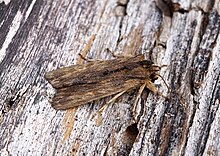Lithophane semibrunnea, the tawny pinion, is a moth of the Noctuoidea family. It is found in scattered populations in North Africa, central and southern Europe and Asia Minor.
| Tawny pinion | |
|---|---|

| |
| Scientific classification | |
| Domain: | Eukaryota |
| Kingdom: | Animalia |
| Phylum: | Arthropoda |
| Class: | Insecta |
| Order: | Lepidoptera |
| Superfamily: | Noctuoidea |
| Family: | Noctuidae |
| Genus: | Lithophane |
| Species: | L. semibrunnea
|
| Binomial name | |
| Lithophane semibrunnea (Haworth, 1809)
| |
Technical description and variation
editThe wingspan is 40–44 mm. Forewing dull wood brown, the inner-marginal half suffused with black brown, blackest on inner margin and in outer half of submedian interspace; veins marked with black scales; lines indistinct; the outer marked by pairs of black dots on veins and a white crescent on submedian fold; the submarginal line by a slighter one; hindwing greyish brown, paler in male, with the terminal area darker.[1] Characteristic of newly emerged moths is a black-brown, often blue shimmering dorsal line, as well as black-brown lines on the shoulders. The dorsal crests on the abdomen are also black-blue; The anterior edge of the forewing is straight compared to other species of the genus, e.g. Lithophane socia. [2]
Biology
editThe moth flies in late autumn.
Larva green; dorsal and subdorsal lines white; spiracular line broad, yellowish white, much varied with white dots and streaks below; head greenish; feeding on ash and other trees. The larvae mainly feed on Fraxinus excelsior.
References
edit- ^ Seitz, A. Ed., 1914 Die Großschmetterlinge der Erde, Verlag Alfred Kernen, Stuttgart Band 3: Abt. 1, Die Großschmetterlinge des palaearktischen Faunengebietes, Die palaearktischen eulenartigen Nachtfalter, 1914
- ^ László Ronkay, José Luis Yela, Márton Hreblay: Hadeninae II. - Noctuidae Europaeae, Volume 5. Sorø, 2001, ISBN 87-89430-06-9, S. 141–143
External links
edit